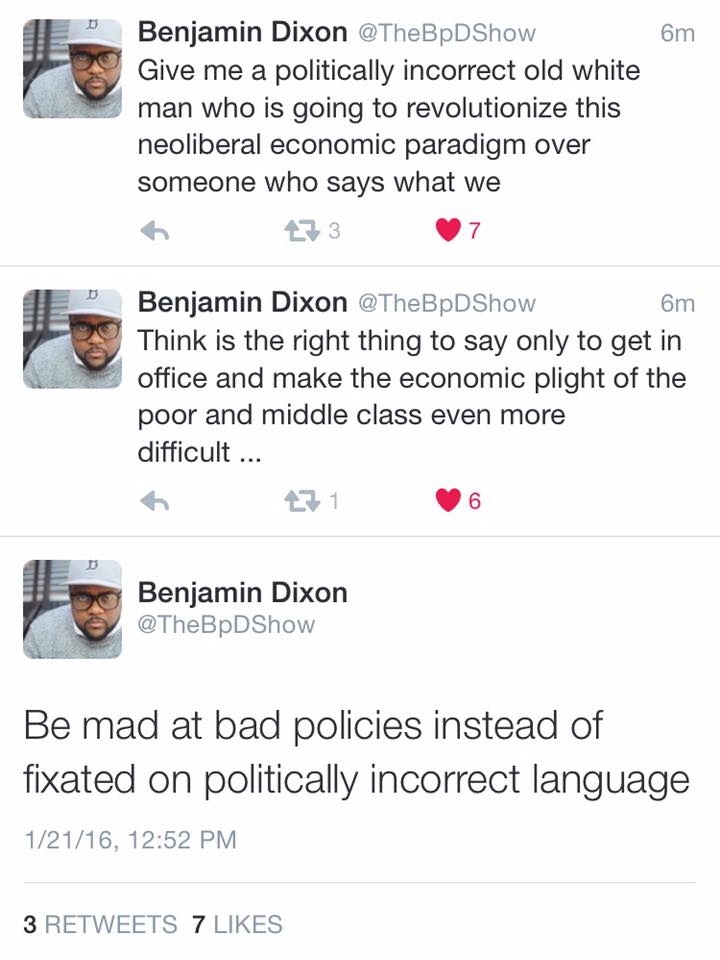I think I’m ready to give a name to a movement I’ve seen for over a year that really troubles me – Regressive Social Justice.
Regressive in the sense that it is willing to actually throw the meaningful policy reform it argues for under the bus in the name of political correctness.
In this presidential race, we saw maybe the first and biggest instance of this when Black Lives Matter protestors took over a Bernie Sanders rally in Seattle, with one protestor saying “I was going to tell Bernie how racist this city is, filled with its progressives, but you did it for me,” accusing the audience of “white supremacist liberalism.”
Along with a confrontation at Netroots Nation earlier this year, it was the beginning of a bizarre chapter in the modern social justice movement: the destruction of Sander’s brand on black issues. To be fair, some of the criticism has been policy-oriented. But given that Sanders, on issues regarding incarceration, education, jobs, and the drug war, has been far superior to Hillary Clinton on just about every relevant metric, much more of it has been just a greater form of language and tone policing, a narcissistic obsession with vocabulary that often dwarfs real interest in meaningful policy changes.
The latest mutation of this bizarre practice now comes in the form of a new essay by Ta-Nahisi Coates, “Bernie Sanders and the Liberal Imagination”. In the essay, Coates takes Sanders to task for saying that fighting for reparations in a likely intractable Congress could be “divisive”, especially when he is similarly fighting for his plans for healthcare and education that many allege to be equally divisive and improbable.
The need for so many (although not all) of Sanders’s supporters to deflect the question, to speak of Hillary Clinton instead of directly assessing whether Sanders’s position is consistent, intelligent, and moral hints at something terrible and unsaid. The terribleness is this: To destroy white supremacy we must commit ourselves to the promotion of unpopular policy. To commit ourselves solely to the promotion of popular policy means making peace with white supremacy.
Coates does make some valid points in this essay, absolutely worthy of discussion in the theoretical space of ideas, and unlike many other writers in his vein he is very fair in talking about Hillary Clinton’s record. The problem I believe lies in the failure of Social Justice Regressives to realize how much branding matters, and that what makes for good theoretical discussion and what helps advance the cause can be two completely different things. I think what he and others don’t realize is that they have tarnished Bernie’s brand so badly – and unfairly – on social justice issues that they may hand the Southern minority vote to Hillary Clinton, in which case Sanders will definitely lose this nomination.
Why should they care? “Tough shit, that’s how the process works” you might say, except that Sanders is the first major candidate for president ever to publicly call for the beginning of the end of the War on Drugs, which, if “The New Jim Crow” is correct – I think it is – is probably the central lynchpin in the incarceration and criminalization of Black America. Bernie wants to legalize marijuana on the Federal level. Hillary Clinton is just fine keeping marijuana as illegal as cocaine. Why does this not set off the alarm bells of the Social Justice left? Hillary Clinton seems to be treated with kid gloves and enjoy much greater esteem within the African American community, bizarrely so when one revisits how she and her husband failed the black community immensely through the War on Drugs and “Tough on Crime” legislation. Is it due to greater media awareness, or her ability to offer more politically correct speech that enables her to escape this as her failures on policy go totally ignored?
Voters as a whole tend to vote based on brand perception rather than details; while Coates and others may be right on the details, I believe they are assaulting the brand only to their own self-defeat. This can and will have real-life repercussions. Will Coates and others effectively “Nader-ize” Sanders, and thus ensure that the drug war is perpetuated for several more generations? Will they hand the Democratic Primary to the candidate who is less in tune with the hugely simmering emotion of working class grievance than Donald Trump is, effectively handing the election to the most openly racist President we’ve seen in generations?
I hope I’m wrong and this concern is unwarranted. I really hope Coates and others, in the name of righting wrongs, do not end up perpetuating the wrongs they seek to right. We can’t afford Regressive Social Justice.
PS – I encourage everyone reading this to watch host Benjamin Dixon‘s response to Coates’s earlier essay on the same topic. Hits many of the same points from a black progressive perspective.
I also suggest you follow him on twitter. I was very impressed with the wisdom he imparted here.





